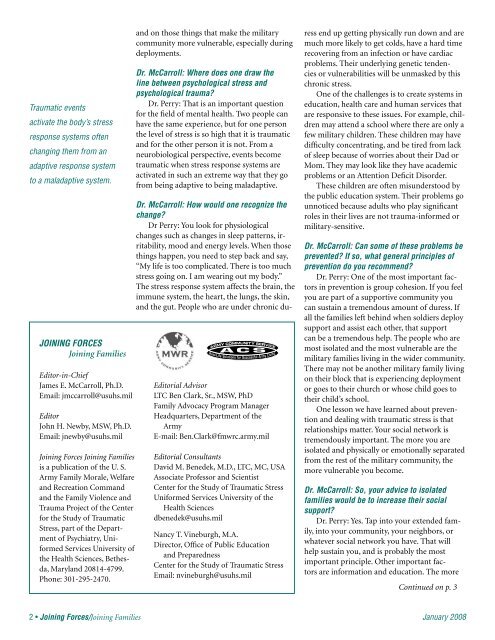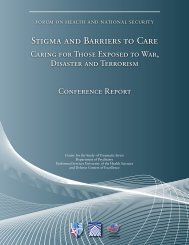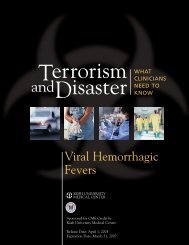An Interview With Bruce D. Perry, MD, PhD - Center for the Study of ...
An Interview With Bruce D. Perry, MD, PhD - Center for the Study of ...
An Interview With Bruce D. Perry, MD, PhD - Center for the Study of ...
You also want an ePaper? Increase the reach of your titles
YUMPU automatically turns print PDFs into web optimized ePapers that Google loves.
Traumatic events<br />
activate <strong>the</strong> body’s stress<br />
response systems <strong>of</strong>ten<br />
changing <strong>the</strong>m from an<br />
adaptive response system<br />
to a maladaptive system.<br />
Joining Forces<br />
Joining Families<br />
Editor-in-Chief<br />
James E. McCarroll, Ph.D.<br />
Email: jmccarroll@usuhs.mil<br />
Editor<br />
John H. Newby, MSW, Ph.D.<br />
Email: jnewby@usuhs.mil<br />
Joining Forces Joining Families<br />
is a publication <strong>of</strong> <strong>the</strong> U. S.<br />
Army Family Morale, Welfare<br />
and Recreation Command<br />
and <strong>the</strong> Family Violence and<br />
Trauma Project <strong>of</strong> <strong>the</strong> <strong>Center</strong><br />
<strong>for</strong> <strong>the</strong> <strong>Study</strong> <strong>of</strong> Traumatic<br />
Stress, part <strong>of</strong> <strong>the</strong> Department<br />
<strong>of</strong> Psychiatry, Uni<strong>for</strong>med<br />
Services University <strong>of</strong><br />
<strong>the</strong> Health Sciences, Be<strong>the</strong>sda,<br />
Maryland 20814-4799.<br />
Phone: 301-295-2470.<br />
and on those things that make <strong>the</strong> military<br />
community more vulnerable, especially during<br />
deployments.<br />
Dr. McCarroll: Where does one draw <strong>the</strong><br />
line between psychological stress and<br />
psychological trauma?<br />
Dr. <strong>Perry</strong>: That is an important question<br />
<strong>for</strong> <strong>the</strong> field <strong>of</strong> mental health. Two people can<br />
have <strong>the</strong> same experience, but <strong>for</strong> one person<br />
<strong>the</strong> level <strong>of</strong> stress is so high that it is traumatic<br />
and <strong>for</strong> <strong>the</strong> o<strong>the</strong>r person it is not. From a<br />
neurobiological perspective, events become<br />
traumatic when stress response systems are<br />
activated in such an extreme way that <strong>the</strong>y go<br />
from being adaptive to being maladaptive.<br />
Editorial Advisor<br />
LTC Ben Clark, Sr., MSW, <strong>PhD</strong><br />
Family Advocacy Program Manager<br />
Headquarters, Department <strong>of</strong> <strong>the</strong><br />
Army<br />
E-mail: Ben.Clark@fmwrc.army.mil<br />
Editorial Consultants<br />
David M. Benedek, M.D., LTC, MC, USA<br />
Associate Pr<strong>of</strong>essor and Scientist<br />
<strong>Center</strong> <strong>for</strong> <strong>the</strong> <strong>Study</strong> <strong>of</strong> Traumatic Stress<br />
Uni<strong>for</strong>med Services University <strong>of</strong> <strong>the</strong><br />
Health Sciences<br />
dbenedek@usuhs.mil<br />
Nancy T. Vineburgh, M.A.<br />
Director, Office <strong>of</strong> Public Education<br />
and Preparedness<br />
<strong>Center</strong> <strong>for</strong> <strong>the</strong> <strong>Study</strong> <strong>of</strong> Traumatic Stress<br />
Email: nvineburgh@usuhs.mil<br />
Dr. McCarroll: How would one recognize <strong>the</strong><br />
change?<br />
Dr <strong>Perry</strong>: You look <strong>for</strong> physiological<br />
changes such as changes in sleep patterns, irritability,<br />
mood and energy levels. When those<br />
things happen, you need to step back and say,<br />
“My life is too complicated. There is too much<br />
stress going on. I am wearing out my body.”<br />
The stress response system affects <strong>the</strong> brain, <strong>the</strong><br />
immune system, <strong>the</strong> heart, <strong>the</strong> lungs, <strong>the</strong> skin,<br />
and <strong>the</strong> gut. People who are under chronic duress<br />
end up getting physically run down and are<br />
much more likely to get colds, have a hard time<br />
recovering from an infection or have cardiac<br />
problems. Their underlying genetic tendencies<br />
or vulnerabilities will be unmasked by this<br />
chronic stress.<br />
One <strong>of</strong> <strong>the</strong> challenges is to create systems in<br />
education, health care and human services that<br />
are responsive to <strong>the</strong>se issues. For example, children<br />
may attend a school where <strong>the</strong>re are only a<br />
few military children. These children may have<br />
difficulty concentrating, and be tired from lack<br />
<strong>of</strong> sleep because <strong>of</strong> worries about <strong>the</strong>ir Dad or<br />
Mom. They may look like <strong>the</strong>y have academic<br />
problems or an Attention Deficit Disorder.<br />
These children are <strong>of</strong>ten misunderstood by<br />
<strong>the</strong> public education system. Their problems go<br />
unnoticed because adults who play significant<br />
roles in <strong>the</strong>ir lives are not trauma-in<strong>for</strong>med or<br />
military-sensitive.<br />
Dr. McCarroll: Can some <strong>of</strong> <strong>the</strong>se problems be<br />
prevented? If so, what general principles <strong>of</strong><br />
prevention do you recommend?<br />
Dr. <strong>Perry</strong>: One <strong>of</strong> <strong>the</strong> most important factors<br />
in prevention is group cohesion. If you feel<br />
you are part <strong>of</strong> a supportive community you<br />
can sustain a tremendous amount <strong>of</strong> duress. If<br />
all <strong>the</strong> families left behind when soldiers deploy<br />
support and assist each o<strong>the</strong>r, that support<br />
can be a tremendous help. The people who are<br />
most isolated and <strong>the</strong> most vulnerable are <strong>the</strong><br />
military families living in <strong>the</strong> wider community.<br />
There may not be ano<strong>the</strong>r military family living<br />
on <strong>the</strong>ir block that is experiencing deployment<br />
or goes to <strong>the</strong>ir church or whose child goes to<br />
<strong>the</strong>ir child’s school.<br />
One lesson we have learned about prevention<br />
and dealing with traumatic stress is that<br />
relationships matter. Your social network is<br />
tremendously important. The more you are<br />
isolated and physically or emotionally separated<br />
from <strong>the</strong> rest <strong>of</strong> <strong>the</strong> military community, <strong>the</strong><br />
more vulnerable you become.<br />
Dr. McCarroll: So, your advice to isolated<br />
families would be to increase <strong>the</strong>ir social<br />
support?<br />
Dr. <strong>Perry</strong>: Yes. Tap into your extended family,<br />
into your community, your neighbors, or<br />
whatever social network you have. That will<br />
help sustain you, and is probably <strong>the</strong> most<br />
important principle. O<strong>the</strong>r important factors<br />
are in<strong>for</strong>mation and education. The more<br />
Continued on p. 3<br />
2 • Joining Forces/Joining Families January 2008




